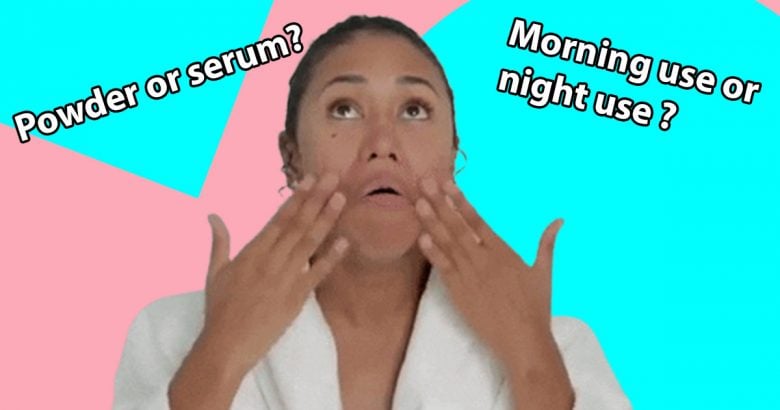
All Of Your Questions About Vitamin C Serums Answered
Remember the days when good skincare was just taking your makeup off after a night out and being really proud about it? Well, those days are over.
Welcome to the modern-day age of skincare, where new products seem to pop up out of nowhere, insisting they need to be added to your daily routine. If you’re anything like me, it’s all starting to get a little bit overwhelming. How many serums does one gal need? What do you mean I should be using retinol but to stop if it makes me break out? Is eye cream really a scam? Why didn’t someone tell me that before I spent $104 on one tiny bottle? Is all this stress and confusion over skincare giving me more wrinkles?
It only felt like three years ago that I had a fairly basic routine down pat: cleanse, tone, moisturise, sunscreen and go about my day. Fast forward to 2021 and now after cleansing, there’s about 23 different serums to add in the morning, and 27 to use at night. But don’t use retinol during the day! And don’t use vitamin C at night! And don’t forget to slap yourself in the face three times because it may produce collagen*.
*I just made that one up, don’t do that.

After I finally learned what retinol was last year, and after I got my head around introducing hyaluronic acid to my routine, I noticed the women in my life had started talking about vitamin C serums. To me, when I think of vitamin C the only thing I think of is the chewy orange tablets my mum used to give me as a kid. But apparently using a vitamin C serum has a whole range of benefits for your skin, from assisting in the treatment and management of fine lines and wrinkles, to serving as an effective line of defence against environmental and lifestyle factors.
But how do you use vitamin C serums best? Is one brand better than the other? Is powder form better than a serum? What happens if breakouts occur after incorporating vitamin C?
Dr. Ginni Mansberg is an Australian GP and co-founder of Evidence Skincare (ESK). ESK is a cruelty-free skincare brand that has gone through rigorous scientific testing to deliver high-quality products to customers.
View this post on Instagram
We spoke to Dr. Ginni Mansberg to get some tips and tricks when it comes to incorporating vitamin C serums into our skincare routine.

When should you put on your vitamin C serum – morning or night or both?
“Vitamin C could be used either time of the day, but most dermatologists recommend it be used in the morning when its UV protective effects are in best use!”
Can you use vitamin C products if you’re on medicated products for acne?
“No need to avoid vitamin C in your skincare if you’re on Tretinoin – either orally or topically. But the order does matter. Vitamin C helps prevent sun damage to the skin so is always used in the morning. Vitamin A on the other hand breaks down in sunlight and can be at best ineffective and at worst toxic, so should ONLY be used at night!”
I’m using a cheaper vitamin C serum and it’s causing me to breakout – why is this?
“While there’s no evidence that this is the case, anecdotally we do hear this a lot. We THINK this is because vitamin C has to be delivered in a water in oil emulsion to keep it stable. Oil can be comedogenic, even finer oils. While some fat-bonded forms of vitamin C can get around this, there is no evidence they do anything for the skin. But even when vitamin C is suspended in non-oil carriers (like silicone) it can still cause a breakout, so let’s just say, we don’t know exactly why that seems to be the case.”
I have sensitive skin and breakouts and I’ve been told to not use vitamin C, even though it’s meant to repair the skin – why is this?
“Frustrating! But the way an ingredient feels when put on the skin doesn’t always line up with how it works when absorbed into the skin. So even though vitamin C has an anti-inflammatory ability, it can initially be irritating on sensitive skin. Most skin can get used to it, but that can take a while. Add to that it’s potential to trigger breakouts and we don’t recommend using it for sensitive or breakout-prone skin. That said, I am on the far side of 50, I’m super breakout-prone and have quite sensitive skin and I use it EVERY day because it is so amazing for brightening my skin and helping on the anti-aging front and I never find it irritating.”
I’ve heard you should only buy expensive vitamin C products – what’s the difference between affordable vit C serums and more high-end ones?
“In good news, money has nothing to do with efficacy! It’s all about the formulation. Look for a 5-10% concentration of L-Ascorbic acid in an airless opaque bottle. A dropper, a tube, or a tub is a red flag. As is ascorbyl palmitate, magnesium ascrobyl phosphate, ascorbyl glucoside and magnesium ascorbyl phosphate, ascorbyl tetra isopalmitate (AKA tetrahexyldecyl ascorbate) and 3-0 ethyl ascorbic acid – they are all NON-evidence based forms of vitamin C. I’d save your money and look for an evidence-based formulation. And finally, if ‘water’ is the first ingredient on the list I would give it a miss.”
Is vitamin C in powder form better?
“No. There is no evidence supporting powder form and there are a number of reasons why it could be irritating and have no benefit.”
Are we able to get a brief explainer on the percentage and concentration levels in vitamin C serums and what women should mainly be looking out for when purchasing?
“The evidence sits between 5 and 10% concentration for L-Ascorbic acid. Look for a pH of around 3.5 or below and an airless, opaque container to protect the vitamin C from going off. Generally, the irritation goes up as concentration goes up and the maximum concentration that can be absorbed by the skin is 20%.”
–
You can take the ESK skin survey here to learn more about your skin and the products that may help you keep that clear and smooth complexion.
